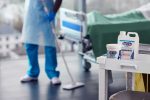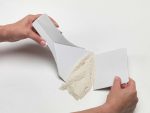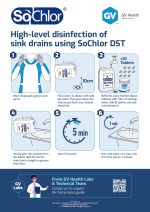Carbapenemase-producing Enterobacteriaceae (CPE) represent a serious and growing threat in healthcare environments. These Gram-negative bacteria are resistant to carbapenem antibiotics, commonly considered drugs of last resort, making infections particularly difficult to treat. In response to this challenge, effective environmental hygiene is critical.
SoChlor DST: A Proven Disinfectant with Broad-Spectrum Efficacy
While SoChlor DST has not been tested directly against CPE strains, it is supported by a robust set of European Norm (EN) certifications confirming its broad-spectrum bactericidal activity. These include:
-
EN 1276 – Quantitative suspension test for the evaluation of bactericidal activity of chemical disinfectants.
-
EN 13697 – Surface test for bactericidal activity.
-
EN 13727 – Bactericidal activity in the medical area.
-
EN 16615 – A surface test simulating practical conditions using mechanical action.
These standards confirm SoChlor DST’s efficacy against key bacterial species, including:
-
Escherichia coli (Gram-negative)
-
Pseudomonas aeruginosa (Gram-negative)
-
Staphylococcus aureus (Gram-positive)
-
Enterococcus hirae (Gram-positive)
The presence of Gram-negative efficacy, particularly against E. coli and P. aeruginosa, provides strong reassurance of SoChlor DST’s potential against CPE, especially considering the UK Health Security Agency’s (UKHSA) position on disinfection.
Guidance from the UK Health Security Agency
“Use any disinfectant which has proven biocidal activity against Gram-negative bacteria.”
This aligns with SoChlor DST’s EN-certified spectrum of action, validating its suitability for use in environments where CPE is a concern.
Moreover, peer-reviewed academic literature supports the efficacy of SoChlor’s active biocide, hypochlorous acid, against CPE. A notable publication in the South African Journal of Preclinical and Allied Science
link to article highlights the effectiveness of hypochlorous acid against these highly resistant organisms.
Best Practice: Clean Before You Disinfect
The UKHSA also strongly emphasises the importance of pre-cleaning surfaces before disinfection. This critical step removes organic material that can impede the action of disinfectants.
For this purpose, Life Protected Cleaner (LPC) is a recommended solution. LPC’s innovative Water Soluble Matrix (WSM) technology ensures effective surface cleaning while supporting sustainability goals. By integrating LPC for cleaning and SoChlor DST for disinfection, healthcare facilities can adopt a high-performance, compliant, and eco-conscious hygiene protocol.
High-level disinfection of sink drains using SoChlor DST
CPE bacteria can survive and even multiply in moist, nutrient-rich environments, such as: Sink traps, drain pipes, and wastewater outlets. So ensuring effective disinfection is critical.
Download our user step guide PDF
For the full protocol guide put together by our technical team, please contact us or speak to your GV Account Manager.
In Summary
SoChlor DST’s EN certifications, its active biocide’s proven efficacy in literature, and alignment with UKHSA recommendations position it as a reliable disinfectant in the fight against CPE. When paired with a strong cleaning regimen using LPC, it supports infection prevention strategies while enhancing operational sustainability.




















